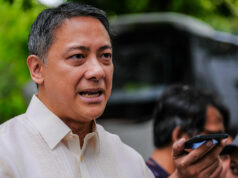Politics and Crisis: A discussion series:The COVID-19 pandemic: A failure of global institutions and a test of national leadership
By The Ateneo de Manila Department of Political Science
Part 7 of an eight-part series
THE COVID-19 PANDEMIC exposed vulnerabilities both of developing and industrialized countries in a globalized world. Rich and poor countries alike have found their governments almost, if not, desperately taking unprecedented actions and policy responses to the pandemic. The speed and scale of the disease has overwhelmed even those with most or highly resilient health systems.
Soon after it was declared as a global public health emergency on Jan. 30, the coronavirus outbreak started a contagion of health crisis to practically all continents. It did not take long before the COVID-19 meltdown metamorphosed into a global pandemic creating a health pandemic alongside economic and financial pandemic worldwide.
Truly, globalization has deepened interdependence among countries in the areas of global security, economy, politics, and health. What has become clear over the past few months, however, is that global institutions and rules failed at a timely issuance of guidelines to contain the pandemic. The World Health Organisation (WHO) and the United Nations (UN) for instance, failed to contain the pandemic. Organizational limitations and internal leadership problems incapacitated these international organizations from taking a swift response to the pandemic.
International financial and economic institutions like the International Monetary Fund (IMF), the World Bank (WB) Group, and G20 took some time, too, to provide significant and immediate assistance to poor countries confronting the pandemic. It was only on April 18, more than two months after COVID-19, the disease caused by the novel coronavirus called SARS-CoV-2, was declared a pandemic, when the IMF, the WB Group, and G20 decided on suspending debt service payments of 76 countries for one year including 40 countries in Sub-Saharan Africa. While the debt moratorium is very much welcomed, these institutions should have intervened much earlier to help poor countries prepare for the pandemic.
At a briefing for the WHO in late March, Kristalina Georgieva, Managing Director of the IMF, already sounded the alarm for the onset of an economic recession due to the COVID-19 pandemic. At the 2020 Spring Meetings International Monetary and Financial Committee (IMFC) Plenary on April 16, she described the pandemic as “a crisis like no other” with the expectation that “global economic activity to decline on a scale we have not seen since the Great Depression.”
While the COVID-19 pandemic raised expectations of global governance, it also heightened expectations of the states. Over the past few months, the world witnessed how the COVID-19 pandemic put to test not only leadership at the global level but also political leadership at the domestic level. Described as the largest test of political leadership, the pandemic brings to the fore the question of why some governments are relatively more successful than others in addressing the pandemic.
Political scientists, comparativists, and international relations experts weighed in with their observations and analysis on the question. In his column in The Atlantic titled, “The Thing That Determines a Country’s Resistance to the Coronavirus,” Francis Fukuyama, author of the contentious end of history thesis, provides a significant insight on domestic leadership. While recent practices suggest that democracies may be performing better, Fukuyama argued that “[T]he major dividing line in effective crisis response will not place autocracies on one side and democracies on the other. The crucial determinant in performance will not be the type of regime, but the state’s capacity and, above all, trust in government.”
THE FAILURE OF GLOBAL INSTITUTIONS AND RULES
The COVID-19 pandemic revealed the relatively weak operational capacities of international organizations like the WHO and the UN. Recently, various governments expressed calls to exact accountability from the WHO for its institutional failure to respond to the health pandemic and its leadership dereliction of its duty.
Given the alarming speed and scale of contagion of the novel coronavirus across continents, the WHO failed to detect early and assess the crisis situation and committed a costly oversight when it declared the outbreak a global public health emergency only at the end of January, when it should have declared it much earlier. Whatever happened to the WHO’s revised International Health Regulations all aimed at enabling a faster, more effective response to outbreaks and emergencies?
The UN is also guilty of dismal performance in relation to the COVID-19 pandemic. A news headline in the New York Times, “UN Security Council ‘Missing In Action’ in Coronavirus Fight” captures succinctly the failure of the UN to address the health pandemic. The UN Director at Human Rights Watch Louis Charbonneau was quoted saying that “[W]e’re in a situation widely recognized as our most urgent security issue, with a large portion of the global population on lockdown, and the Security Council is incapable of doing anything.” This is not the first time that the UN failed the world. Isn’t it?
The failure of these international organisations is partly due to weak operational capacities and partly due to internal leadership crisis. Between the two, it is the latter that constrains most the effectiveness of the WHO and UN. When the epicenter of the COVID-19 pandemic shifted from China to Italy and then to Spain, and now to the US, an international outcry was aimed at WHO Director-General Dr. Tedros Adhanom Ghebreyesus for being an outspoken advocate for China and his exaggerated, unwanted commendation of Chinese government’s COVID-19 response. Ghebreyesus turned a blind eye to the growing evidence of China’s mishandling of the novel coronavirus outbreak, deliberate manipulation of information about the number of its confirmed cases and deaths, blatant disregard of WHO Interim Protocol to contain the initial emergence of pandemic influenza, and rising domestic Chinese outrage over the central government’s censorship.
The UN General Assembly adopted a resolution titled, “Global solidarity to fight the coronavirus disease 2019 (COVID-19)” only on April 2. The resolution came out when there were already 896,475 confirmed coronavirus cases and 45,525 deaths worldwide.
The 15-nation UN Security Council, the organisation’s most powerful agency designated with the task of maintaining international peace and security (Art. 48 of the UN Charter), however, continues to struggle to come up with its resolution on the pandemic.
UN Secretary-General Antonio Guterres’ plea for the Council to act urgently on what he described as “the most challenging crisis we have faced since the Second World War,” was muted by weeks of disagreement between the United States and China, two of the five veto-wielding powers including France, Russia, and Britain. The US and China had been arguing over the origins of the virus with the former insisting that the Council recognizes the Chinese origin of the virus. On April 14, US President Donald Trump suspended US funding for the WHO.
As of this writing, the COVID-19 pandemic has spread to 210 countries and territories worldwide and two international conveyances. The total number of confirmed cases is now at 2,934,651 and the total number of deaths at 203,684.
A TEST OF POLITICAL LEADERSHIP
The Global Health Security Index (2019) had already predicted the current state of the world. Its analysis finds that “[n[o country is fully prepared for epidemics or pandemics” and that “[m]ost countries lack foundational health systems capacities vital for epidemic and pandemic response,” for example, to prevent, detect, and respond to significant infectious disease outbreaks.
As the COVID-19 pandemic overwhelmed health systems and caused widespread social and economic disruption, governments had no choice but to turn inward, prioritizing saving their own people and protecting their societies and economies. In light of available limited empirical data, the combined effect of state capacity and trust in government offers a plausible explanation to the relative success of some governments vis-a-vis others in responding to the COVID-19 pandemic.
Fukuyama (2004) defined state (or institutional) capacity as “the abilities of states to plan and execute policies and to enforce laws cleanly and transparently.” Accordingly, “the most effective type of state is one that is able to select among a broad range of policies, which it can implement equally well, to attain a broad range of outcomes.”
The capacity to implement depends crucially on trust in the government. Without trust in the government, support for immediate actions will be difficult to mobilise, particularly amid crises like the COVID-19 pandemic where urgent, short-term sacrifices are critical for the abatement of the pandemic. Easton (1965) described trust in government as representing the confidence of citizens in the actions of a “government to do what is right and perceived fair.”
State capacity is not a function of size and scale of the bureaucracy. Rather, it is a function of revenue (resources to pay for government operations and to distribute among members of the society), human capital (a well-trained and reliable government workforce) and information (to determine how policy instruments can be used effectively).
The governments of South Korea and Taiwan responded early and successfully to the COVID-19 pandemic. Thanks to their timely and well-planned strategies, both governments are relatively successful in “flattening the curve.” Flattening the curve is potentially spreading out the number of coronavirus cases over a longer period so that health systems can have time to mitigate the impact of the disease.
Steve Sternberg, Assistant Managing Editor for Health Initiatives, captured in his report in US News & World Report the reasons why Taiwan is a model of success in containing COVID-19.
“Following the 2003 SARS epidemic, Taiwan dramatically built up its public health infrastructure to launch an immediate response to the next crisis. Well-trained and experienced public health officials were quick to recognize the crisis and launched an emergency public health response to contain the emerging outbreak. Taiwan has a national health insurance program [and] was able to link its national health insurance database with its customs and immigration records and quickly identify anyone who entered the country from China and sought medical care. By 20 January, the government activated the Central Epidemic Command Center and charged it with coordinating all government efforts to combat the growing health crisis. In an effort to contain the epidemic, Taiwan employed the most powerful tools at its disposal — big data and analytics.”
Taiwan contained the outbreak at the time when the WHO was still downplaying the spread of the virus because of its confidence in China’s “extraordinary measures” to contain the outbreak. Trust in the Taiwanese government by its citizens can never be denied by the 8.17 million voters (or 57.1% of the popular vote) who re-elected President Tsai Ing-wen.
In The Week’s feature on “South Korea’s coronavirus success,” the factors that account for South Korea’s success in addressing the outbreak include “early mass testing, tracking and isolating all contacts of those infected… developing and stockpiling test kits in early January, as soon as Chinese scientists released the virus’s genetic code and before a single Korean had been infected.”
Like Taiwan, lessons from an outbreak of Middle East Respiratory Syndrome (MERS) in South Korea in 2015 caused the government to draw up new rules for health crises, empowering the Korea Centers for Disease Control and Prevention to take full authority to direct local responses.
More extreme measures, however, were undertaken when in mid-February hundreds of people at several services at the Shincheonji Church of Jesus in Daegu were infected by the novel coronavirus. Invasive surveillance tactics to track worshippers at Shincheonji churches across the country were used through phone data and an extensive CCTV network of 8 million cameras. Moreover, anyone who tested positive was sent to one of the quarantine centers set up in hotels and company dorms.
Had the South Korean government mishandled the coronavirus outbreak, the Democratic Party of Korea would have not won by a landslide in the National Assembly elections on April 15. The landslide victory of South Korea’s President Moon Jae-ins’ left-leaning Democratic Party was an endorsement of the people’s trust in the government.
FRAGILE INSTITUTIONS AND RESILIENT STATES?
While COVID-19 has taught us about the fragility of the UN and the resilience of states amid crisis, the institutions of global health governance, such as the global scientific community and global civil society are not lacking in response.
However, in light of the current problems that besiege WHO and the UN, are some unanswered questions about their relevance: Does the COVID-19 pandemic teach us about the fragility of international organisations or the resilience of states amid crisis? Will the pandemic render international organisations irrelevant and obsolete or will it bring the state and trust in government back in? How will states manage the post-pandemic order? Finally, will the world be better prepared after the COVID-19 pandemic?
Previous columns in this series can be accessed here:
• https://www.bworldonline.com/politics-and-crisis-a-discussion-series-governing-the-pandemic/



